

ASCL What are the best bets of remote learning. Review Your Remote Education Provision framework Schools (1) Remote education research. Introduction Since March 2020, the need for and the expectations placed on remote education have changed considerably.
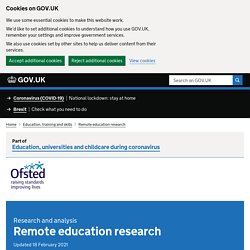
Remote schooling: new EEF evidence review highlights core features that can u... PLUS new package of EEF resources for schools and parents to help them make the most of remote learning during Covid-19 closures Pupils can learn through remote teaching, but there are some key steps to take to make sure it is as effective as possible.
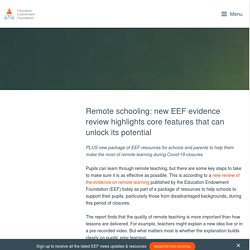
This is according to a new review of the evidence on remote learning published by the Education Endowment Foundation (EEF) today as part of a package of resources to help schools to support their pupils, particularly those from disadvantaged backgrounds, during this period of closures. The report finds that the quality of remote teaching is more important than how lessons are delivered. Get help with remote education. Ofsted publishes short guide to what works well in remote education. Last week, the government published new guidance that strengthened expectations for the provision of remote education while schools and colleges remain closed to most pupils.
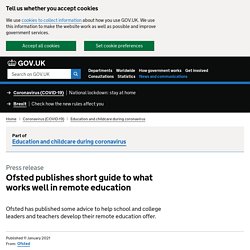
Today, Ofsted has published some useful advice for leaders and teachers, aimed at helping them develop their remote education offer. The advice has been written by the head of Ofsted’s research team, Professor Daniel Muijs, and draws on findings from Ofsted’s interim visits, as well as wider sources. It sets out some common myths about remote education and counters them with evidence-based pointers. LearntoLearn learning. Department of Education.
Jump to table of contents Learning to Learn – A Framework for Early Years Education and Learning was published in October 2013.
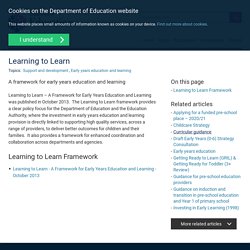
Remote learning for pupils. Tfel framework guide complete(1) Tfel framework overview(1) TfEL Framework - Australian Curriculum SA Teachers & Leaders Resource. Headteachers' standards 2020. Introduction Headteachers are leading professionals and role models for the communities they serve.
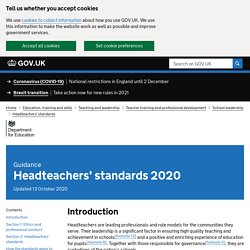
Their leadership is a significant factor in ensuring high quality teaching and achievement in schools[footnote 12] and a positive and enriching experience of education for pupils[footnote 8]. Together with those responsible for governance[footnote 5], they are custodians of the nation’s schools. Parents[footnote 6] and the wider public rightly hold high expectations of headteachers, given their influential position leading the teaching profession and on the young people who are their responsibility. The headteachers’ standards set out how headteachers meet these high expectations. EEF Metacognition and self regulated learning (1) The curriculum challenge…renewed. People have gone relatively quiet about the ‘c’ word… curriculum.

Whilst schools grapple with the challenges of having all pupils safely attend school, then everything has to be considered anew. The careful sequencing of curriculum still matters a great deal, but as schools are recommended to consider lopping great bits off, then new plans and considerations about curriculum emerge. EEF Blog: Assessing learning in the new academic year (Part 1 of 2) – three k... Assessment - to help identify pupils' learning gaps following Covid-19 school closures - has emerged as one of the top priorities for schools preparing for the new school year.
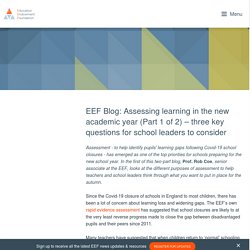
In the first of this two-part blog, Prof. Rob Coe, senior associate at the EEF, looks at the different purposes of assessment to help teachers and school leaders think through what you want to put in place for the autumn. ResearchEDHome 2020 Tom Sherrington: Rosenshine's Principles and Curriculum Design: Connection? Six models of lesson observation. Inspecting education quality Lesson observation report. How to assess intent and implementation of curriculum 191218. Inspecting education quality workbook scrutiny report. Research for education inspection framework 160519. Curriculum design under a new Ofsted regime. The new Ofsted inspection framework will see a focus on the breadth of a school’s curriculum offer, including its ‘intent’, ‘implementation’ and ‘impact’.

In light of these changes, Matt Bromley looks at how schools might plan their curriculum It will not have escaped your notice that Ofsted has published a draft new Education Inspection Framework (EIF) which will come into effect in September 2019. A consultation has just concluded over the proposals and the outcomes have just been published. In addition to an overall effectiveness grade, schools will receive a graded judgement for each of the following areas: Quality of education, Behaviour and attitudes, Personal development, and Leadership and management.
As such, “outcomes for pupils” and “teaching, learning and assessment” are no longer standalone judgements, instead incorporated into the new “quality of education” measure. Intent, implementation and impact Why is Ofsted introducing a new framework? The local curriculum. Education inspection framework (EIF) Skip to main content Tell us whether you accept cookies We use cookies to collect information about how you use GOV.UK.
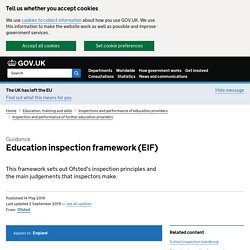
We use this information to make the website work as well as possible and improve government services. Set cookie preferences You’ve accepted all cookies. The UK has left the EU Find out what this means for you Hide message Is this page useful? A beginner’s guide to: Professor Barak Rosenshine - EdBlogs - EdCentral. Best known for: Iimage source: Baltimore Curriculum Project Rosenshine's research has contributed significantly to understanding the effectiveness of various instructional methods, which culminated in his identification of 10 principles of effective instruction.
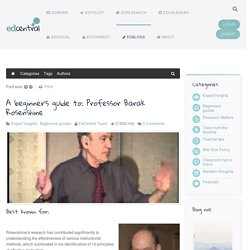
Quick facts: Born: 1930, Chicago, Illinois Deceased: May 2017, Urbana, Illinois. 17 Teaching Principles of Effective Instruction. @TeacherToolkit In 2010, Ross Morrison McGill founded @TeacherToolkit from a simple Twitter account through which he rapidly became the 'most followed teacher on social media in the UK'. In 2015, he was nominated as one of the '500 Most Influential People in Britain' by The Sunday...
Read more about @TeacherToolkit What makes a teacher, highly effective? Curriculum Thinking. Blog collection all in one place. School workload reduction toolkit. How to use the toolkit The resources in this toolkit have been produced by school leaders, teachers and other sector experts in conjunction with the Department for Education (DfE), and have been tested with a range of schools across England. You can use these resources to: identify workload issues in your school address workload issues in your school (such as feedback and marking) evaluate the impact of workload reduction measures You can adapt these resources to fit your school context. Reducing school workload. Understanding the Equality Act: information for disabled students.
Equality Act 2010: advice for schools. Equality Act Advice Final. The Equality Act: What schools need to know. The Equality Act 2010 replaced nine major pieces of legislation and should make it easier for school leaders and governors to understand their legal responsibilities and tackle inequalities in education. Bill Bolloten explains what schools need to know. In his first annual report as chief inspector of education, published in November, Sir Michael Wilshaw wrote: “In the most effective schools, the headteacher and governors establish a clear vision, rooted in an unwavering commitment to ensure the success of every pupil.
Equality of opportunity is at the heart of this vision, with an insistence that all pupils will do well.” Headteachers' standards. National standards of excellence for head teachers. Early in 2014, the DfE announced a review of the 2004 non-mandatory head teacher standards. NAHT had the opportunity to be involved in the review as NAHT's vice president, Tony Draper, was on the review group and took part in a number of meetings to represent our views. The review group elected for very aspirational standards, which will remain non-mandatory, and while these are useful to support head teacher professional development, we were very concerned they could be used against heads by employers and governing bodies.
The review body accepted this was a risk and decided to develop some associated guidance on how these should be used, which is very helpful, and states that: “The standards are different from the teachers’ standards in that they are non-mandatory and they do not set a baseline of expected performance. These standards are intended as guidance to underpin best practice, whatever the particular job description of the head teacher. 10 top tips for school leaders and governing boards - Sutton Trust. 10 top tips for school leaders and governing boards Last week, the Education Endowment Foundation published the EEF Guide to Becoming an Evidence-Informed School Governor and Trustee, designed to offer a quick way into the evidence the EEF makes freely available to all schools. Here are top 10 tips, based on this report. Know your school’s attainment gaps. Find out which groups of pupils in your school the data suggest need particular support.
Ask your school for its gap data from Analyse School Performance (ASP), formerly RAISEonline, used by Ofsted inspectors. Putting Evidence to Work: A School’s Guide to Implementation. Putting Evidence to Work - A School’s Guide to Implementation. A Guide To The SEND Code of Practice [Updated for 2019-20] Are you compliant with the SEND Code of Practice? The most recent SEND Code of Practice, released in 2014 and updated in 2015, has been the catalyst for the biggest changes in provision for pupils with special educational needs in a generation. SEND Code of Practice: a summary. SEND code of practice: 0 to 25 years.
Supporting early career teachers. These documents outline the planned support for early career teachers. Teaching and Learning Toolkit. Toolkit Strand. Phonics is an approach to teaching reading, and some aspects of writing, by developing learners’ phonemic awareness. This involves the skills of hearing, identifying and using phonemes or sound patterns in English. The aim is to systematically teach learners the relationship between these sounds and the written spelling patterns, or graphemes, which represent them. Phonics emphasises the skills of decoding new words by sounding them out and combining or ‘blending’ the sound-spelling patterns. How effective is it? Phonics approaches have been consistently found to be effective in supporting younger readers to master the basics of reading, with an average impact of an additional four months’ progress.
For older readers who are still struggling to develop reading skills, phonics approaches may be less successful than other approaches such as Reading comprehension strategies and Meta-cognition and self-regulation. How secure is the evidence?